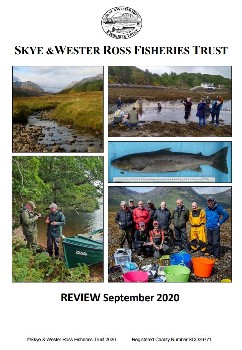SWRFT Review September 2020 Published
Posted: Thursday 24 September, 2020 @ 09:31:41

The Skye and Wester Ross Fisheries Trust Review September 2020 presents a summary of the work of the Skye and Wester Ross Fisheries Trust during the 15 months up to the start of the Covid-19 pandemic in March 2020 and other related information, and can be found by clicking here or via the link below:
For many rivers, rod catches of salmon and of sea trout were amongst the lowest on record (Part 2.1). Juvenile salmon were surveyed at sites on the mainland and on the Isle of Skye; fry numbers were very low in some rivers (Part 2.2). High numbers of parasitic sea lice were recorded on sea trout sampled at coastal sites around the SWRFT area, but not everywhere (Part 3).
Much of our work continued to focus on learning how emissions of larval sea lice from marine salmon farms affected wild fish. Several new salmon farms with 2000+ tonne biomass consents were granted planning permissions (Part 3.3). From July 2019, applicants for new salmon farms were required to present a sea lice dispersal model with their planning application. These models demonstrate the potential for further increases in concentrations of infective stage sea lice several tens of kilometres away from fish farms of projected origin, according to coastal currents and wind direction.
In contrast to sea trout, wild salmon post-smolts which become infested with sea lice remain at sea. Those which migrate through areas with high cumulative concentrations of infective stage lice may have been more vulnerable than has so far been established through sampling. Hence much concern and many hours of largely unpaid work by the Wester Ross Area Salmon Fishery Board in response to planning consultations, informed by the results of some of the Trust’s work (Part 4); and research by scientists at the Scottish Government’s Marine Scotland Science (Part 5).
In 2020, the Trust was to participate in a collaborative West Coast salmon tracking project led by the Atlantic Salmon Trust to learn more about migration pathways of wild post-smolt salmon.
Some long awaited results of genetic studies of wild trout around the Loch Maree area were reported (Part 6). Anadromous trout populations appeared to be resilient in some areas, able to keep going despite being subject to high levels of sea louse infestation. Parasitic sea lice detach from their host after a few days in freshwater; some sea trout which were able to move to estuary pools recovered. An abundance of readily available food may have also helped. Spring spawning herring were again recorded to the west of Gairloch (Part 7.1).
The Trust also supported student projects to learn more about seabed habitats of importance to wild fish populations (Part 7.2) and has continued to raise awareness and actively support the control of non-native invasive species (Part 8). The Trust’s Biologist has also worked with other organisations including the Portree Angling Association and the Wester Ross Biosphere with a focus on issues of shared interest and concern (Part 9).
Our wild salmon and wild trout populations are special things that have survived and adapted to changing environments over millennia. The Wester Ross Fisheries Trust (which joined with the Skye Fisheries Trust to form SWRFT in 2017) was established in response to the threats they face, in recognition of their value to humankind and as a critical part of the biosphere’s complex web of life.
The challenge of looking after wild salmon is now as great as it has ever been. When all the anxiety and disruption associated with the Coronavirus has settled back down, one hopes that our self-sustaining wild salmon populations are given the level of protection required not just to prevent further extirpation of local populations but to revive prolific runs of these remarkable fish for those who come after.
Thank you for your interest and support.
Peter Cunningham, September 2020